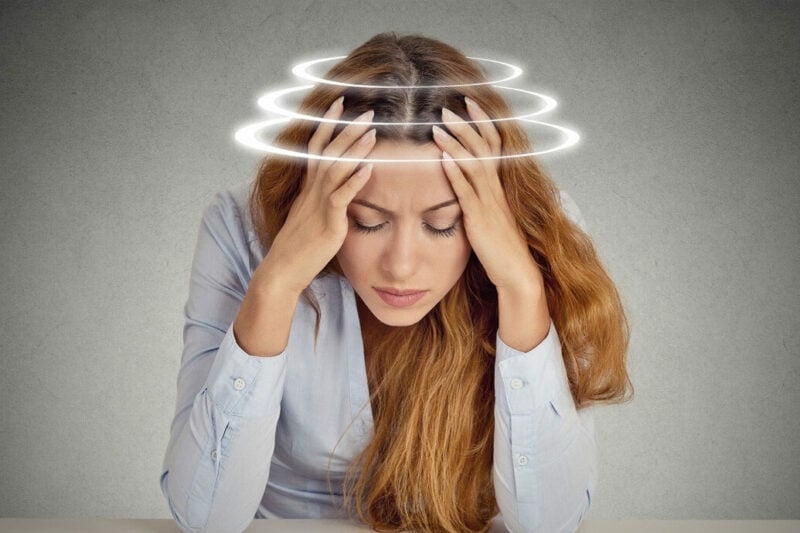Call Us
Updated Feb 20, 2021
Dizziness is complex, vague, and can cause great concern and anxiety for those affected by it. It’s also a very common condition and actually accounts for the second most reported complaint at doctor visits. For many, it’s a poorly understood condition and seeing three different health professionals can leave you with three different causes for your symptoms. We provide some clarity by presenting the 10 most common reasons why you may be experiencing dizziness.
Dizziness vs. Vertigo vs. Lightheadness vs. Imbalance
Dizziness is symptom that can be very specific or very hard to describe. For medical professionals, dizziness is the general term that refers to everything from a spinning sensation to a foggy head to losing your balance when you walk.
We can define dizziness more specifically in these following ways:
Vertigo
This is the sensation of motion that should not be there. It’s usually described as a feeling that you’re spinning or that the room is spinning, or can be felt like you’re being pulled in a specific direction.
Central instability at rest
This is the sensation of rocking or swaying when you’re still
Lightheadedness
This is a vague sensation commonly described as having a floating head or feeling ungrounded. It’s usually persistent, and can often comes with anxiety, being overheated or feeling as if you’re about to faint.
Imbalance
This is the loss of stability that occurs when you change position quickly or while you are walking.
1. Postural Hypotension
Also known as orthostatic hypotension, this is the temporary dizziness that occurs as a result of a sudden drop in blood pressure with sitting up or standing up quickly. Typically there is a history of low blood pressure (average being 120 systolic /80 diastolic mm Hg). Check your blood pressure in lying and compare it to sitting or standing. If the difference is greater than 20 mm in systolic or diastolic, then this may be a potential cause for your dizziness.
2. Circulatory problems
Conditions that affect blood flow through the body or general cardiovascular health, can create symptoms of dizziness. Common causes include anemia (decreased red blood cell numbers), hormonal changes (as with menstrual cycles and menopause), atherosclerosis, blood clots, and dehydration.
Recent evidence supports heart disease as one the leading causes of symptoms of dizziness. Ensure you’ve had a recent physical and that your blood work is up to date. You may require a cardiac stress test and ECG to more definitively rule out this common cause.
3. Neurological conditions
These can be a more serious causes of dizziness as they result in changes to the structure and function of our brain. Common causes include:
Neurodegeneration – such as Multiple Sclerosis, where nerves lose their ability to communicate with each other. Or Parkinson’s Disease (a progressive disease involving the loss of dopamine, needed for normal nerve signal transmission)
Stroke or Cerebral Vascular Accidents (CVA) – resulting in a sudden loss of blood flow to a part of your brain
Local brain tumor – a rare cause of dizziness, but if present, this growth of abnormal tissue can compress on parts of your brain that processes information about head position and motion.
4. Stress, Anxiety and Depression
Depression and anxiety are often mistakenly thought of as purely psychological issues, where in fact they have real physical effects on the functioning of our body processes. A sudden flare up in this area (e.g. a panic attack), excessive exposure to stress (work, family, financial, health), or prolonged, unmanaged anxiety and depression, can all lead to irregular nervous system activity which can produce various symptoms of dizziness.
These causes are commonly overlooked as both patients and medical providers can dismiss this as a legitimate source of dizziness. However, proper treatment can be highly effective in managing and eliminating your symptoms.
5. Cervicogenic Dizziness
Problems with your cervical spine (neck) including sprains/strains, acute injuries, and degenerative disc disease can result in a disruption to the joints, muscles and nerves. This can send abnormal neural messages to the balance centres of your brain about positioning, which then can create dizziness.
Cervicogenic dizziness is often seen with concussions, whiplash disorders, inflammatory arthritis (e.g. rheumatoid or ankylosing spondylitis), and chronic neck pain. This condition is effectively treated with orthopaedic physiotherapy.
Learn more about cervicogenic dizziness here.
6. Migraines
Migraines are the severe headaches and sensitivity to light and sound that is thought to be related to unusual nerve and blood flow activity of the head and brain. The majority of migraine sufferers report having dizziness with their attacks.
When migraines are consistently associated with dizziness, this can be more specially diagnosed as vestibular migraine or migraine associated vertigo. Vestibular rehabilitation can be helpful here, as can medication and the avoidance of migraine triggers.
7. Medications
Medications introduce chemicals into our bodies that, while have helpful or even life-saving benefits, can produce dizziness due to it’s unwanted effects on our inner ear, brain, hormone regulation and circulation.
Aspirin and Diuretics – results in temporary dizziness and improves when medication is removed.
Aminoglycoside Antibiotics – have a permanent ototoxic effect on the inner ear creating dizziness and imbalance
e.g. streptomycin, gentamicin
Anti-cancer drugs – can have a permanent dizziness effect
Your physician can alter dosages or switch you to a different, similar medication. When symptoms are permanent, then vestibular rehabilitation from a qualified therapist can be helpful.
8. Hypoglycemia
Hypoglycaemia refers to a drop in blood sugar levels and can produce dizziness symptoms. This condition can be a temporary one of little concern, or can be a serious health concern.
Common temporary causes include:
- diabetics that are inconsistent with medication and/or meals
- drinking alcohol excessively
- excessive exercise with poor hydration or nutritional habits
Serious causes can include:
- kidney failure, resulting in a loss of oxygen to the brain
- liver disease or infections (noted by an elevation in liver enzymes in your blood)
9. Breathing disorders
Individuals who have various forms of respiratory disease or are in respiratory failure can suffer from dizziness due to the lack of appropriate oxygen distribution throughout the body. However in some cases it can simply be related to hyperventilation which in turn is commonly related to certain psychological disorders.
Blood work, oxygen saturation tests, pulmonary function tests are commonly used to help diagnose dizziness related to a breathing disorder.
Post Covid-19 Syndrome (Long Covid or Long Haulers) has now been added to the list of conditions that can result in dizziness due to it’s effect on lung function and on the balance system in our heads. Click here to learn more about the breathing exercises you need to recover from this condition.
10. Vestibular dysfunction
This is one of the most common causes of dizziness.
Your vestibular system is made up of your inner ear organ and it’s neural connections to your brain. It allows you to sense head position and motion. Problems with this system can result in a variety of dizziness complaints.
Inner ear infection – can damage the vestibular nerve and can initially cause ear pain, hearing issues and vertigo, then sometimes result in long term dizziness issues. These conditions are known as vestibular neuritis or labyrinthitis.
BPPV – Benign Paroxysmal Positional Vertigo; a mechanical problem with the inner ear where small calcium carbonate crystals get dislodged and disrupt the functioning of the inner ear canals creating strong symptoms of vertigo. Click here to learn more.
Central vestibular disorders – conditions such as Persistent Postural Perceptual Dizziness (PPPD) and Mal de Debarquement (MdDS) affect how your brain processes information about head movement, creating sensations of rocking, swaying and imbalance.
Concussion or head injury – can also disrupt our brain’s ability to process information properly, creating confusion in the areas that coordinate head, eye and body movement, resulting in dizziness symptoms. Click here for our Guide to Post Concussion Syndrome
The root cause of your dizziness can be difficult to diagnose, even for physicians and specialists. Our Dizziness Clinics perform comprehensive assessments to help patients narrow down the source of their symptoms and provide effective treatment (given their issue is a vestibular one). For those with other non-vestibular causes, we provide a report back to your doctor, for testing recommendations and to help guide them to alternative diagnoses.
To learn more about Vestibular Rehabilitation for Dizziness, click here.
Cornerstone Physiotherapy has Dizziness Clinics in Toronto, North York, Markham and Burlington, ON.
For more information about our programs, click here.

Questions? We're happy to help!
Choosing the right service provider can be a big decision. We’re dedicated to answering any questions you have to help you make the best choice. Contact us today and ask us anything!
Call us at (416) 238-6749




